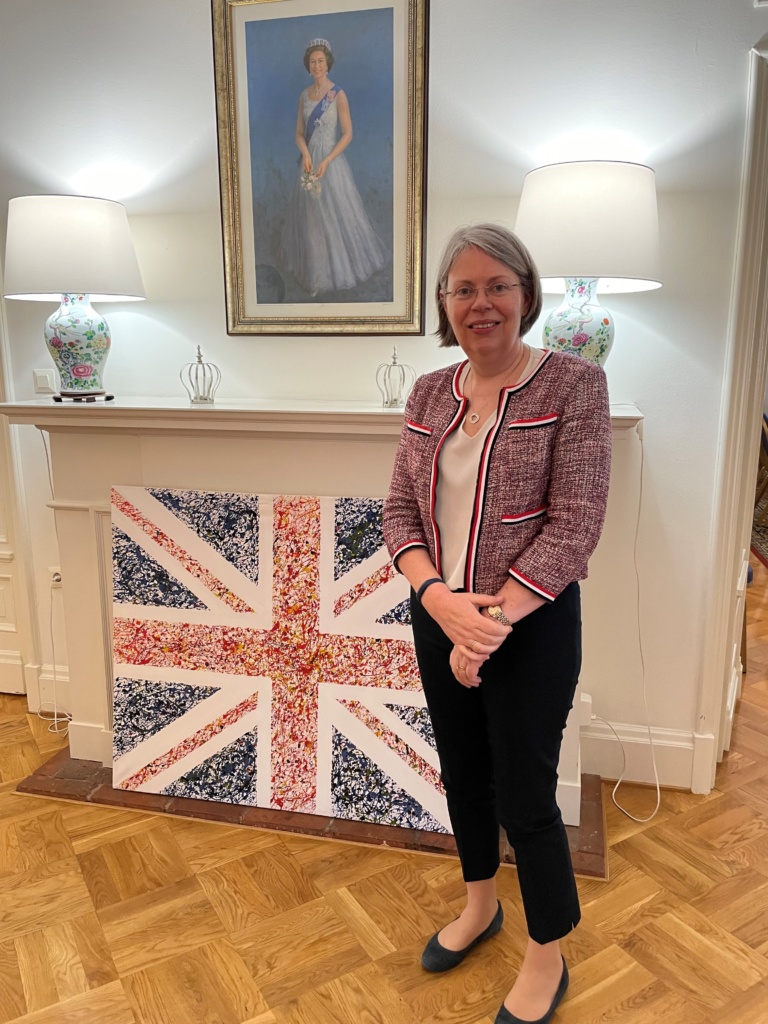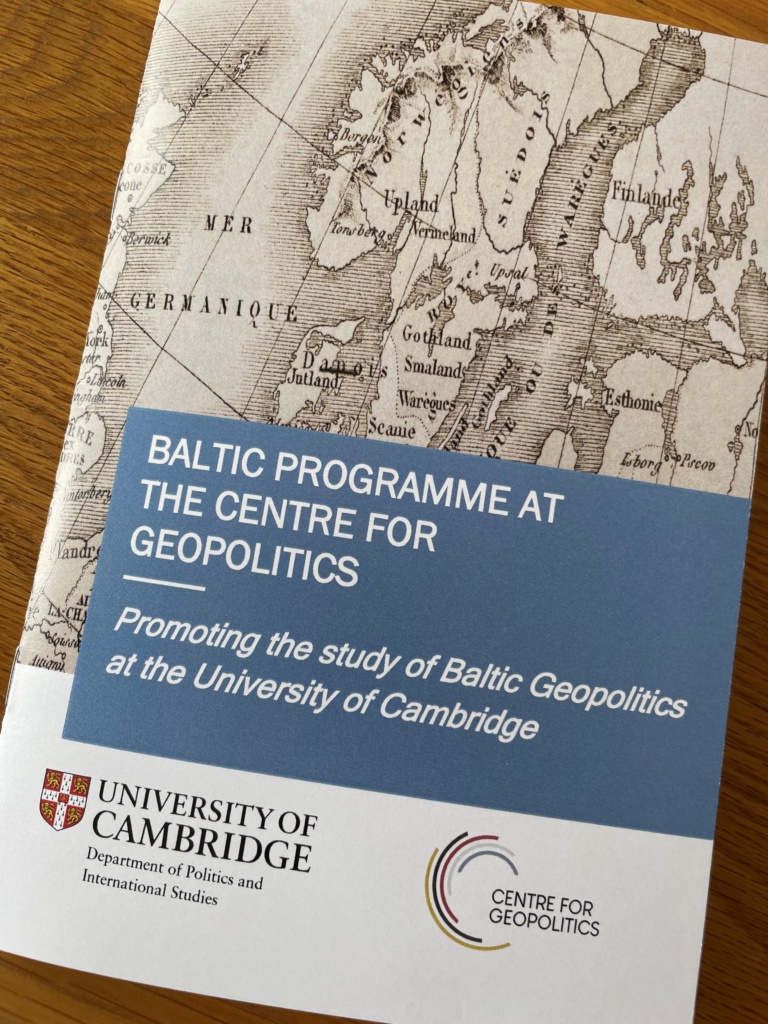Her Britannic Majesty’s Ambassador to Finland, Mrs Theresa Bubbear, hosted a panel discussion at the Embassy Residence on Tuesday 3 May 2022.
“Britain’s connections with Finland long predate the establishment of an independent Finnish state. In general, the Finns have sought to avoid being caught up in a rivalry between the British and another major power, such as Russia or Germany.

During the Crimean War, the Royal Navy (together with the French) attacked the Tsarist Russian fortress of Bomarsund in southern Finland. After the First World War, the Royal Navy helped to shield the emergence of the new state of Finland, a function she also exercised with regard to Estonia just across the Gulf of Bothnia.

A few years later, British diplomats played an important role in mediating the intractable ‘Aland island dispute’ between Finland and Sweden, one of the first issues which the young League of Nations helped to resolve. In 1939-1940, after Finland was attacked by Stalin, Britain and especially British civil society sought to help. In 1945, the UK played a more controversial role in the vindication of Soviet claims against Finland. As the resolution of the Aland island dispute nears its 100 anniversary, and as Brexit means that Finland and the UK are no longer part of the same politico-legal ordering system, our distinguished panel looks back at Britain’s relationship with the Finns and Finland over time, one which has been shaped by law as much as war.1)”
Professor Brendan Simms, the Director of the Baltic Programme at the Centre for Geopolitics at the University of Cambridge, facilitated the discussion of the distinguished panel speakers:
- Juhana Aunesluoma, Professor of Political History, University of Helsinki. Author of Britain, Sweden, and the Cold War, 1945-1954 (Palgrave Macmillan, 2003).
- H.E. Theresa Bubbear, Her Majesty’s Ambassador to Finland
- Rt. Hon Charles Clarke, Former UK Home Secretary and Co-Chair of Baltic Geopolitics Programme at Centre for Geopolitics, Cambridge
- Henrik Meinander, Professor of History, University of Helsinki. Author of History of Finland (Hurst, 2022)
Each panellist started by introducing the history and context until the present day. First, Henrik Meinander provided the background up until the peace treaty in September 1944. Henrik Meinander commented that after the war in 1944, the UK saw Finland as a buffer against Bolsheviks; lost strategically. Finland was considered as an alarm bell for any alarming developments during the Cold War. When it became clear that the Cold War was not developing into a bigger conflict, UK’s position started to change and interest rekindled.
Juhana Aunesluoma outlined the frames typically used by the British to view Finland as a part of a bigger picture: first, the Eastern European frame. Then over time, the Nordic frame has become stronger. Finns on the other hand, view the British via three key frames: first called “Atlantic” frame is focused on security, balancing the Soviet power via Nato. The second frame, which Juhana Aunesluoma called the “European”, is focused on trade and economy, based on Britain having been the leading country for Finnish exports until the 1980s. And the last, “Global” frame stems from the times of the British Empire and culture, particularly the power of the English language. Juhana Aunesluoma mentioned the significance of this “soft power” via culture, entertainment, language, and travel, and said that perhaps the impact of the soft power has not yet been researched enough.
HMA, Theresa Bubbear continued with the theme of soft power by telling an example of her appointment as the British Ambassador to Finland and her discussion with President Sauli Niinistö about the power of football in uniting nations. This story sparked other comments about football, for example by the Rt. Honorable Charles Clarke remarking on the Norwich City team’s unfortunate fate, having to leave the Premier League at the end of the season even though the Finnish striker, Teemu Pukki has been the star of the team and is also seen as a role model in Norwich.
Even if trade between Finland and Britain has dwindled since the 1980s, there are many areas of collaboration that keep on giving, for example in the areas of education, English language, music, and clean tech, e.g. turning waste into energy. Also, defence and security are areas where Finnish and British collaboration has remaineded strong. British interest towards Finland has increased recently as a result of the war in Ukraine, and sales of books about the Winter War have increased dramatically on Amazon.
The panel opened for questions from the audience, and the first question was “would Britain give security guarantees to Finland whilst it waits for ratification to become a NATO member?”The diplomatic answer was: “be patient – it is inconceivable that Britain would leave Finland and Sweden unprotected”. This repeated the message the HMA had already given in an interview on 22.4.2022 to Ilta-Sanomat (please find a link below). Also, a day later, the British Defence Minister confirmed the same to the Finnish media.
There was also a question about JEF (Joint Expeditionary Force), set up in June 2018, to respond to crises and defend the security of Northern Europe. The panel clarified the relationship between NATO and JEF and said that JEF can decide to act where NATO might not be able to. This may become very important during the interim time of waiting for the NATO membership acceptance. The world has learnt that it is possible to defend yourself against Russia, but one must have friends and allies.
Notes and further information:
1) Introduction from the Embassy invite to the event
2) A link to Ilta-Sanomat article on 3.5.2022: “Entinen brittiministeri: tästä syystä Suomi halutaan Natoon. Tunnetun turvallisuus asiantuntijan mukaan Itämeren alueen puolustus on kokonaisuus, johon myös Suomea tarvitaan.”
3) A link to Ilta-Sanomat article on 22.4.2022: “Suomeen kohdistuu nyt valtava kiinnostus, sanoo Britannia suurlähettiläs IS:lle – ”Halusitte tai ette, Suomi on nyt etulinjassa”. Suurlähettiläs Theresa Bubbearin mukaan Britannia on valmis tukemaan Suomea Nato-hakemuksen jättämisen jälkeen, jos Suomi itse pyytää sitä.”
